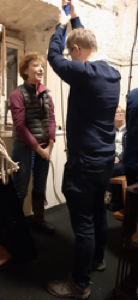Want to learn to ring?
Why learn to ring?
Bell-ringing is a tradition which goes back more than 400 years. It has brought pleasure and solace to generations of people who are ringers or hear the sound of the bells from our churches.
Learning to ring is the start of a life-long learning adventure - you’ll become part of a community that stretches all over the world. Ringers from the Llandaff and Monmouth Association have been made welcome at towers from Hawaii to New Zealand.
Ringing combines physical and mental skill, working as part of a team. You don’t have to be particularly strong as the bell does most of the work, and you only have to be fit enough to climb the steps to the ringing room.
It takes about 20 hours to learn to “handle” a bell to the stage that you can join us for ringing on Sundays and practice nights. As with any skill, the more practice you put in, the quicker you will learn. Once you can handle a bell you can join ringers at other local towers and ring every night of the week if you want to!
Enjoyment from Bellringing
CCCBR Video about why ringers ring:
FAQs
What makes a good ringer?
A ringer needs a sense of coordination, good rhythm and to be able to work as a team. Some commitment to attend practices, to do a bit of self-directed learning, and a little patience to overcome occasional frustrations is also helpful.
Do you have to go to church?
You don’t have to be a Christian to ring bells. Some ringers are members of the church, but many others aren’t.
You’re not expected to attend any religious events as a ringer.
What does it cost?
Bellringing is a very cheap hobby as it’s all volunteer led, and you might even get paid for ringing at weddings!
You don’t need any special equipment, just clothes that allow you to lift your arms above your head easily.
Do you need to be musical?
No! Ringers think in terms of patterns and sequences, in much the same way that you would if you were dancing.
What is the time commitment?
Most ringers attend a practice one evening per week and are encouraged to help with ringing for Sunday services when they are available. They also have the opportunity to ring together in other towers and socialise more widely.
Do you need to be strong?
Watch a skilful ringer and you will see a smooth, almost effortless performance. Bell control is all about feel and timing, not brute force, as gravity does most of the work. Good ringing is all about perfecting technique, not strength.
Is it dangerous?
All activities have a risk, but generally bellringing is not at all dangerous
Feet remain firmly on the floor, and there is no swinging around like you see on TV sometimes.
In the Media
 1. Lynn Bowles (BBC Radio Wales) Learns to Ring
1. Lynn Bowles (BBC Radio Wales) Learns to Ring
Watch and listen as Lynn Bowles learns to ring at Rumney, Cardiff.
The media below has been provided by BBC Radio Wales but is hosted by us with their permission.
Click on the links to play directly in our own media-player. Right-click to download.
Video:
Lynn Bowles tries out bellringing (1:01mins, 6.6MB)
Audio clip from the programme:
Find out what happened when Lynn tried out ringing for the first time (10:58mins, 127MB)
2. Penarth Ringers feature in The Cardiffian
Really good, informative article in The Cardiffian by a journalism student featuring the ringers of St Augustine, Penarth.
Sign Up Here!
Please complete the form below. When you click "Submit" an email will be sent to the Association Master.




